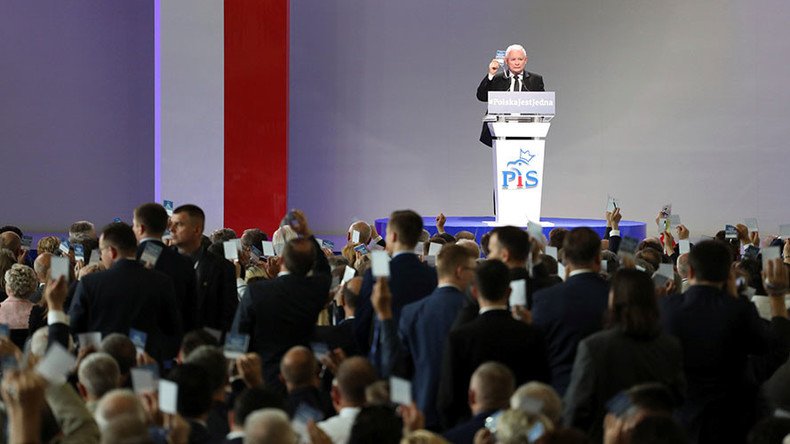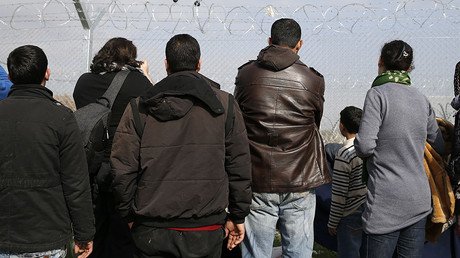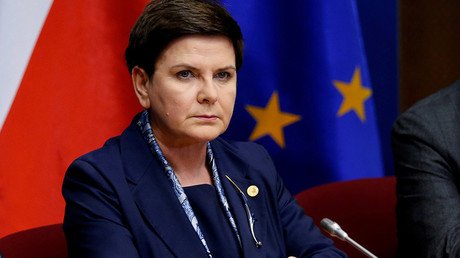Poland has ‘moral right’ to demand compensation for WWII, accession to EU – former PM

Poland has a “moral right” to seek compensation for the losses it sustained in the World War II as well as for the economic damage it suffered as a result of joining the EU, Jaroslaw Kaczynski, the leader of the ruling Law and Justice (PiS) Party and former PM has said.
“It is important to remind … our critics in the West that Poland was the first country that had to stand up to the German Nazism and, 17 days later, was attacked by another genocidal totalitarianism, the Soviet Union,” Kaczynski said in his speech at the PiS congress on Saturday.
He went on to say that Poland never received any compensation for “that gigantic damage, from which it has not recovered even today,” adding that his country never relinquished its right for compensation and has a “moral right” for that while “those, who think otherwise, are wrong,” as reported by the Polish Forsal.pl business news media outlet.
However, the politician did not stop at that and said that the EU also owes Warsaw a sort of compensation as almost all the benefits that came from the Poland’s accession to the union were reaped by its partners in Western Europe.
Poland opened its market 12 years before joining the EU as a pre-accession measure, Kaczynski said, adding that “Polish cheap labor … also benefited those [western] economies.”
“As for the use of the European funds, they also benefit the [western] businesses and those countries are cashing in on them. The [western] enterprises located in Poland transfer tens of billions of zlotys every year without paying any taxes,” the politician said.
At the same time, the PiS leader said that “no one” can accuse his party of anti-European bias as it supported Poland’s accession to the EU ahead of the national referendum on the matter. He went on to say that his party also “appreciates the EU funding” as it “provides various types of investments” and contributes to the financing of the projects in the social sphere.
He also said that Poland’s foreign policy is based on two “pillars”: NATO and the EU.
Returning to the topic of Poland’s “moral rights,” Kaczynski also said that his country as a right to say “no” to the idea of accepting any refugees as it has nothing to do with the causes of the refugee crisis.
"We have not exploited the countries from which these refugees are coming to Europe these days, we have not used their labor force and finally we have not invited them to Europe. We have a full moral right to say 'no'," Kaczynski said, as cited by Reuters.
Taking in refugees that should be resettled to Poland under the EU relocation program could create a “big security-related problem,” which “is not just about terrorism but also about ordinary everyday security,” he said.
“There is no reason for us to radically lower our living standards and the quality of life in Poland,” the politician added, as he listed the problems that could arise from complying with the EU demands concerning the relocation of refugees.
At the same time, he said that Poland is ready and willing to help refugees directly in their countries of origin.
Poland was among the states that have been consistently opposing the EU plan to relocate over 100,000 migrants who have already reached the continent, throughout Europe. In total, nearly 21,000 asylum-seekers have been distributed throughout Europe since the launch of the relocation program, some 14,000 from Greece and the rest from Italy.
However, Poland has not yet accepted any refugees. In response to the European Commission’s latest move, Warsaw said it intended to carry on with its current migration policy and did not intend to accept its quota of refugees that amounts to some 6,100 people.
In mid-June, the European Commission launched legal action against Poland, Hungary, and Czech Republic, claiming that those countries had not “taken the necessary action” in dealing with migrants and refugees.
In response, Polish Deputy Foreign Minister Konrad Szymanski told the Polish Press Agency (PAP) that his country is ready to defend its right to not take in refugees in an EU court.














